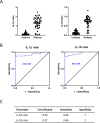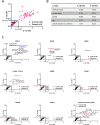Blood-based test for diagnosis and functional subtyping of familial Mediterranean fever
- PMID: 32312770
- PMCID: PMC7307214
- DOI: 10.1136/annrheumdis-2019-216701
Blood-based test for diagnosis and functional subtyping of familial Mediterranean fever
Abstract
Background and objective: Familial Mediterranean fever (FMF) is the most common monogenic autoinflammatory disease (AID) worldwide. The disease is caused by mutations in the MEFV gene encoding the inflammasome sensor Pyrin. Clinical diagnosis of FMF is complicated by overlap in symptoms with other diseases, and interpretation of genetic testing is confounded by the lack of a clear genotype-phenotype association for most of the 340 reported MEFV variants. In this study, the authors designed a functional assay and evaluated its potential in supporting FMF diagnosis.
Methods: Peripheral blood mononuclear cells (PBMCs) were obtained from patients with Pyrin-associated autoinflammation with an FMF phenotype (n=43) or with autoinflammatory features not compatible with FMF (n=8), 10 asymptomatic carriers and 48 healthy donors. Sera were obtained from patients with distinct AIDs (n=10), and whole blood from a subset of patients and controls. The clinical, demographic, molecular genetic factors and other characteristics of the patient population were assessed for their impact on the diagnostic test read-out. Interleukin (IL)-1β and IL-18 levels were measured by Luminex assay.
Results: The ex vivo colchicine assay may be performed on whole blood or PBMC. The functional assay robustly segregated patients with FMF from healthy controls and patients with related clinical disorders. The diagnostic test distinguished patients with classical FMF mutations (M694V, M694I, M680I, R761H) from patients with other MEFV mutations and variants (K695R, P369S, R202Q, E148Q) that are considered benign or of uncertain clinical significance.
Conclusion: The ex vivo colchicine assay may support diagnosis of FMF and functional subtyping of Pyrin-associated autoinflammation.
Keywords: familial mediterranean fever; fever syndromes; inflammation.
© Author(s) (or their employer(s)) 2020. Re-use permitted under CC BY. Published by BMJ.
Conflict of interest statement
Competing interests: None declared.
Figures




References
-
- Van Gijn ME, Ceccherini I, Shinar Y, et al. . New workflow for classification of genetic variants' pathogenicity applied to hereditary recurrent fevers by the International Study Group for systemic autoinflammatory diseases (INSAID). J Med Genet 2018;55:530–7. 10.1136/jmedgenet-2017-105216 - DOI - PubMed
Publication types
MeSH terms
Substances
LinkOut - more resources
Full Text Sources
Medical
Miscellaneous

